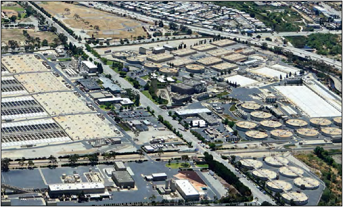Variants of COVID-19 virus detected in Southern California wastewater streams

SCCWRP and its partners have found that variants of the SARS-CoV-2 virus – including mutations found in the virus’s Eta variant lineage – can be detected in wastewater influent streams across Southern California using next-generation DNA sequencing methods.
The proof-of-concept study, published in September by the journal Applied and Environmental Microbiology, was able to strongly correlate viral levels in wastewater with COVID-19 case counts in five major Southern California sewersheds.
The findings are an important step forward in ongoing efforts to use wastewater streams to track COVID-19 infection rates in communities, including the Delta and Eta variants.
During the study, researchers also examined whether the same sequencing methods could be used to monitor other pathogenic viruses in wastewater – including adenoviruses, bocaviruses, influenza A, noroviruses and coronaviruses other than SARS-CoV-2. This effort was successful as well, suggesting that wastewater has the potential to be used to monitor multiple types of population-wide outbreaks.
More news related to: Microbial Risk Assessment, Microbial Water Quality